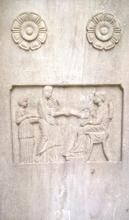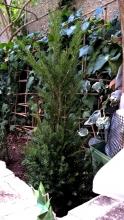By Eirini Tsotsou on March 02, 2018
Hekate’s association with the stars can be seen from the other goddesses that she is connected with and their qualities. Hekate appears to be Selene (Moon) in Apollius Rodios and Ovid's Metamorphoses. In the Hellenistic period Hekate was Selene in the sky, Persephone in the Underworld (Hades), Artemis in the Earth. Nonnus (5th century a.C.) is writing that Selene is Hekate of many names. In the PGM we can find hymns and many magickal spells that associate Hekate with Selene, especially hymns to the moon.
By Eirini Tsotsou on March 02, 2018
Offering a juice to the Goddess or drinking it to attune with her energies. The juice has also the energy of happiness.
By Eirini Tsotsou on March 02, 2018
This is a recipe for homemade pitta bread to be used as an offering to Goddess Hekate.
By Constantinos Nt... on March 02, 2018
Necropolis means the city of the dead. The archaeological place of Kerameikos in its biggest part is a necropolis, a place associated with death, religious practices, and art. For the first time, I will present info about Hekateion, the temple of Hekate in necropolis, and a Triangular Hiero of an unknown Goddess, standing in three ways crossroads, next to the way of Eleusis.
By Constantinos Nt... on March 02, 2018
Strophalos or Iynx is an ancient hellenic symbol dated before 2300 b.C. It was connected with the Goddess Hekate and later with Her aspect of Cosmic Soul, sending the Ideas from the Paternal God to the Creator God. Strophalos, triskelion, gammadion-tetraskelion and labyrinth are symbols that look like each other but the uses of strophalos are quite different. Through the help that was provided by the ancient Hellenes writers from Xenophon to Proclus, Damascius and Michael Psellos we will discover the uses, the form and the idea behind the magickal tool of the Witches-Theurgists of Hekate.
By Eirini Tsotsou on March 02, 2018
In this article you are going to read ancient texts from the book of Pausanias the geographer, which are related to Hekate. In this article we are meeting our Goddess in Corinth, Argolis and Aegina.
By Constantinos Nt... on March 02, 2018
Hekate in Necromancy by Loukianos
By Constantinos Nt... on March 02, 2018
Yew or Taxus baccata is one of the trees associated with Hekate, necromancy, magickal wands etc. In this article I will present some info for growing that tree and its magickal properties. My purpose is to give you all the info you will need to have a yew friend in your yard. Just go to your plant store, ask Taxus baccata, buy some biological calcium, 2-3 handfulls of rocks, read this article and plant your yew.
By Eirini Tsotsou on March 02, 2018
The word “Hermekate” can be found in Papyri Graecae Magicae III. 1-59 and the explanation that is provided by some is that “Hermes and Hekate are perhaps a “natural match,” in any case, due to their similar functions and associations, though their mythology does not often overlap” or that “Hermekate is son of Hekate and Hermes”. Yet any other sources other than PGM cannot be found. In Betz's book, it is written: "the name Hermekate is a combination of Hermes and Hekate".
By Constantinos Nt... on March 02, 2018
Goddess Hekate. The invocation I am going to write derives from the PGM XII 238-245. It is an invocation to the almighty God, but I have modified it slightly to invoke the Goddess Hekate. The invocation is very beautiful, truely poetic. I have added the invocation to a well structured ritual, for anyone who wants to follow it or modify it according to its magickal tradition.
Pages


















It amazes me how so many traditions follow these ancient protocols and roles,